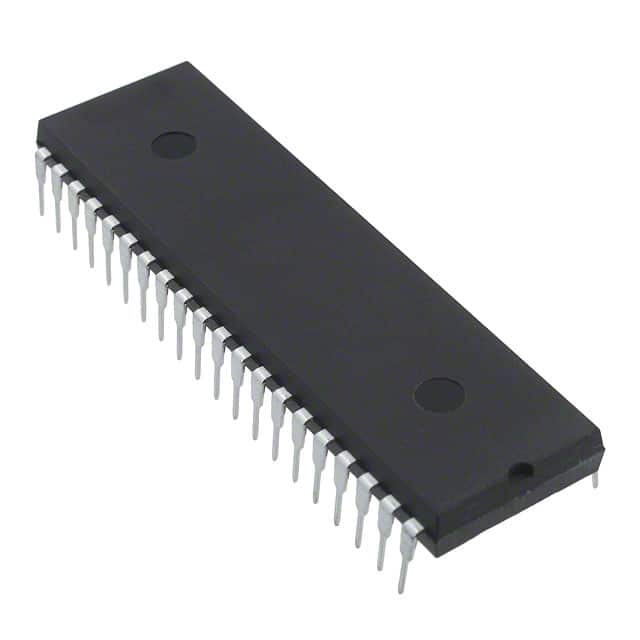Viz Specifikace pro podrobnosti o produktu.

TMS320C10NL-25
Product Overview
Category
The TMS320C10NL-25 belongs to the category of digital signal processors (DSPs).
Use
It is primarily used for processing and manipulating digital signals in various applications such as telecommunications, audio and video processing, image recognition, and control systems.
Characteristics
- High-performance DSP with a clock speed of 25 MHz
- 16-bit fixed-point architecture
- On-chip memory for program storage and data storage
- Multiple integrated peripherals for enhanced functionality
- Low power consumption
Package
The TMS320C10NL-25 is available in a 68-pin plastic leaded chip carrier (PLCC) package.
Essence
The essence of the TMS320C10NL-25 lies in its ability to efficiently perform complex mathematical operations on digital signals, enabling real-time processing and analysis.
Packaging/Quantity
The TMS320C10NL-25 is typically sold in reels or trays, with each reel containing a specific quantity of chips. The exact packaging and quantity may vary depending on the supplier.
Specifications
- Clock Speed: 25 MHz
- Data Word Length: 16 bits
- Instruction Set: Modified Harvard Architecture
- On-Chip Memory: 2K x 16 ROM, 256 x 16 RAM
- I/O Ports: 8 general-purpose I/O pins
- Serial Ports: 2 serial ports for communication with external devices
- Interrupts: 4 levels of interrupt priority
Detailed Pin Configuration
The TMS320C10NL-25 features a total of 68 pins, each serving a specific purpose. The pin configuration is as follows:
- VDD - Power supply voltage
- GND - Ground reference
- XTAL1 - Crystal oscillator input
- XTAL2 - Crystal oscillator output
- RESET - Reset input
- CLKOUT - Clock output
- A0-A15 - Address bus
- D0-D15 - Data bus
- RD - Read control signal
- WR - Write control signal
- INT0-INT3 - Interrupt inputs
- TMS - Test mode select
- TDI - Test data input
- TDO - Test data output
- TCK - Test clock input
- TMS320C10NL-25 specific pins (continued...)
Functional Features
The TMS320C10NL-25 offers several functional features that enhance its performance and versatility:
- High-speed arithmetic logic unit (ALU) for efficient mathematical operations
- Multiply-accumulate (MAC) unit for fast multiplication and accumulation of data
- Programmable I/O ports for interfacing with external devices
- Serial ports for communication with peripherals
- On-chip memory for program storage and data storage
- Interrupt capability for handling time-critical events
- Power management features to optimize power consumption
Advantages and Disadvantages
Advantages
- High-performance DSP with a clock speed of 25 MHz
- Efficient processing of digital signals in real-time
- Integrated peripherals reduce the need for external components
- Low power consumption for energy-efficient applications
- Compact package size for space-constrained designs
Disadvantages
- Limited on-chip memory compared to newer DSPs
- 16-bit fixed-point architecture may not be suitable for certain applications requiring higher precision
- Availability of alternative models with more advanced features
Working Principles
The TMS320C10NL-25 operates based on the principles of digital signal processing. It receives digital signals as input, performs various mathematical operations on them using its ALU and MAC unit, and produces processed output signals. The processor executes instructions stored in its on-chip memory to perform these operations, utilizing the available peripherals for data transfer and communication.
Detailed Application Field Plans
The TMS320C10NL-25 finds applications in various fields, including:
- Telecommunications: Signal processing in telecommunication systems, such as voice compression and decompression, echo cancellation, and channel equalization.
- Audio and Video Processing: Real-time audio and video processing, including noise reduction, audio effects, image recognition, and video compression.
- Control Systems: Implementation of control algorithms in industrial automation, robotics, and automotive systems.
- Medical Imaging: Processing and analysis of medical images for diagnosis and treatment purposes.
- Consumer Electronics: Integration into consumer electronic devices like digital cameras, portable media players, and home theater systems.
Detailed and Complete Alternative Models
While the TMS320C10NL-25 is a capable DSP, there are alternative models available with more advanced features. Some popular alternatives include:
- TMS320C50 - Higher clock speed, improved instruction set, and increased on-chip memory.
Seznam 10 běžných otázek a odpovědí souvisejících s aplikací TMS320C10NL-25 v technických řešeních
Sure! Here are 10 common questions and answers related to the application of TMS320C10NL-25 in technical solutions:
Q: What is TMS320C10NL-25? A: TMS320C10NL-25 is a digital signal processor (DSP) chip manufactured by Texas Instruments.
Q: What are the key features of TMS320C10NL-25? A: Some key features include a 16-bit fixed-point DSP core, 25 MHz clock speed, on-chip memory, and various peripherals for interfacing with external devices.
Q: What are the typical applications of TMS320C10NL-25? A: TMS320C10NL-25 is commonly used in applications such as audio processing, speech recognition, telecommunications, motor control, and industrial automation.
Q: How does TMS320C10NL-25 handle real-time processing tasks? A: TMS320C10NL-25 is designed for real-time processing with its high-speed clock and dedicated DSP architecture, allowing it to efficiently handle time-sensitive tasks.
Q: Can TMS320C10NL-25 be programmed using C language? A: Yes, TMS320C10NL-25 can be programmed using C language along with assembly language for low-level optimizations.
Q: Does TMS320C10NL-25 support floating-point arithmetic? A: No, TMS320C10NL-25 is a fixed-point DSP chip and does not have built-in hardware support for floating-point arithmetic.
Q: How much on-chip memory does TMS320C10NL-25 have? A: TMS320C10NL-25 has 512 words of on-chip program memory and 256 words of on-chip data memory.
Q: Can TMS320C10NL-25 interface with external devices? A: Yes, TMS320C10NL-25 has various peripherals like serial ports, timers, and parallel I/O pins that can be used to interface with external devices.
Q: What is the power supply requirement for TMS320C10NL-25? A: TMS320C10NL-25 typically operates at a supply voltage of +5V DC.
Q: Are there any development tools available for programming TMS320C10NL-25? A: Yes, Texas Instruments provides development tools like compilers, assemblers, debuggers, and evaluation boards specifically designed for programming and testing TMS320C10NL-25-based solutions.
Please note that these answers are general and may vary depending on specific implementation details and requirements.

